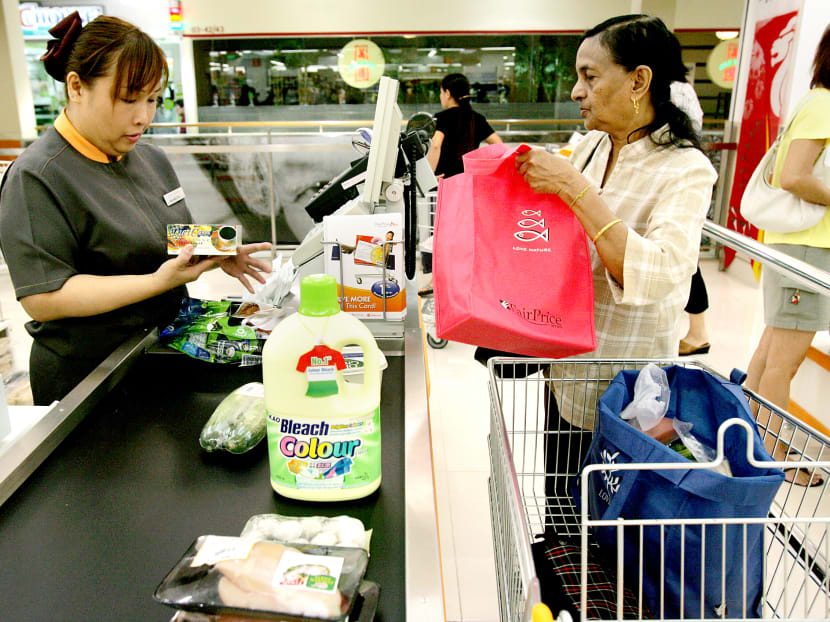CPI falls again, adding to economy concerns
SINGAPORE — Consumer prices fell last month for the 15th straight month in the longest streak in nearly forty years, helping households stretch their dollar while at the same time raising fears that the economic outlook will worsen.

A shopper at an FairPrice supermarket. Although food prices have been buoyant, economists warn that due to financial volatility, consumers may need to be cautious. TODAY file photo
SINGAPORE — Consumer prices fell last month for the 15th straight month in the longest streak in nearly forty years, helping households stretch their dollar while at the same time raising fears that the economic outlook will worsen.
As the decline in private transport and housing costs accelerated, the All-Items Consumer Price Index (CPI) fell 0.6 per cent last month, data from the Monetary Authority of Singapore (MAS) and the Ministry of Trade and Industry (MTI) showed on Tueday (Feb 23). The drop was at a similar pace as December but sharper than the 0.4 per cent fall forecast by economists in a Reuters poll.
The MAS and MTI on Tuesday cut their 2016 forecast for headline inflation to between minus 1 per cent and 0 per cent from the earlier forecast of between minus 0.5 per cent and 0.5 per cent, citing the significant step-down in global oil prices in recent months and the larger-than-expected decline in Certificate of Entitlement (COE) premiums at the start of the year.
It left the full-year forecast for MAS core inflation, which excludes the costs of accommodation and private road transport, unchanged at between 0.5 and 1.5 per cent.
“This is the 15th consecutive month of negative inflation, the longest slump since 1977 (when prices fell for 16 straight months) and it will remain the case for several more months, against the backdrop of low oil prices. In fact, chances are high that this will become a record stretch in two months,” said DBS senior economist Irvin Seah.
Ms Selena Ling, OCBC Bank’s head of treasury research and strategy, said: “The man in the street is getting a very nice break, due to the fall in oil prices and the policy-driven measures that are affecting car and housing prices. Prices are softening and the labour market is still strong — consumers are getting the best of both worlds.”
“Although food prices have been quite buoyant, this is a trade-off to the lower prices of the other ticket items. However, due to financial volatility and negative news of weak global growth outlook coming from China and the world, consumers may still bear some cautiousness in spending,” she added.
Some economists have also warned that a persistent weakness in prices signals tough times ahead.
“The growth slowdown has further compounded the disinflationary pressure. This will likely become more pronounced in the coming months with an overhanging risk of a technical recession. Whenever inflation hits a trough, the economy usually dips into recession. Historically, every trough is marked by some form of economic difficulty,” Mr Seah noted.
Singapore will release its fourth-quarter gross domestic product data on Wednesday, with economists polled by Reuters expecting growth to be revised downwards to 1.8 per cent year-on-year from the initial 2 per cent estimate. On a sequential basis, fourth-quarter GDP growth is expected at 4 per cent, slower than the 5.7 per cent in the initial estimate, the poll showed.
Last month, private road transport prices fell by 1.8 per cent, accelerating from the 1.1 per cent drop in December, due to a sharper decline in car prices amid weaker COE premiums. Accommodation costs declined by 3.1 per cent, extending the 3 per cent drop in the preceding month, reflecting the soft housing rental market. Food inflation rose to 1.7 per cent last month from 1.5 per cent the previous month, due to a larger increase in non-cooked food prices which more than offset the smaller rise in the prices of prepared meals.
MAS core inflation rose to 0.4 per cent in January from 0.3 per cent a month earlier, due mainly to a smaller reduction in electricity tariffs and higher food and retail goods inflation, which more than offset the fall in services inflation, the MAS and MTI said.






